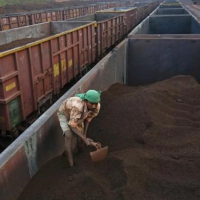Breakthrough in Rajya Sabha for Key Bills to Resurrect Mining Industry
 Iron ore being loaded on to a freight train (file photo: Reuters)
Iron ore being loaded on to a freight train (file photo: Reuters)
The government achieved a breakthrough in the Rajya Sabha on Friday, with the upper house passing two bills to auction mines that produce minerals such as coal, iron ore and bauxite. This will help reenergise the mining industry that has languished for years.
The Mines and Minerals Development and Regulation, and Coal Mines Special Provisions bills were seen as a test of the government's ability to secure support from opposition parties in the Rajya Sabha where the ruling BJP lacks a majority.
The coal provides for auctions of coal mines and awards the right, title and interest over mine infrastructure together with mining leases to successful bidders through a transparent bidding process.
According to Hindustan Times, failure to pass the bill, already cleared by the Lok Sabha, would have put into jeopardy the status of mines already auctioned, which have yielded revenue of more than Rs 200,000 crore ($32 billion) from winning bids.
The mines and minerals bill was passed earlier in the day by the Rajya Sabha after the government agreed to the amendment recommended by the select committee on March 18.
The bill was passed in the upper house with all parties, barring Congress and the Left, supporting it. It was passed with 117 members voting in favour and 69 against it.
Opposition parties Trinamool Congress, NCP, SP, BSP, BJD, AIADMK, DMK and JMM supported the government, along with its allies Shiv Sena and SAD, while the JD-U walked out before the vote.
The break in Opposition unity was largely due to the increased revenue that state governments would gain under the bill. Many regional parties in the Opposition nationally are in power at the state level.
"The politics of obstructionism led by Congress lost today," Finance Minister Arun Jaitley said after the mines and coal bills were passed in Parliament.
The mines bill will now be taken up by the Lok Sabha, where the BJP enjoys an overwhelming majority. Both bills will replace earlier ordinances promulgated by the government that would have otherwise lapsed by April 5.
According to Reuters, the country’s mining sector has been mired in controversy over the illegal allocation of resources, causing a near standstill in granting permits to open new mines, including an iron ore exploration licence for South Korean steel giant POSCO that wants to set up a steel plant in India.
Asia's third largest economy was once the world's third-largest exporter of iron ore but now has to import heavily due to court curbs on illegal mining. The Supreme Court has eased some of the curbs, but state officials have been slow to renew mining licences, fearing charges of corruption.
The government hopes auctions will reduce the risk of wrongdoing, helping to put the mining industry back on track. But it is unlikely to lead to a sudden surge in iron ore output as there is a global glut and prices have crashed.
The coal bill, meanwhile, would allow the government to continue auctioning off mines under a process that began last month after the Supreme Court cancelled more than 204 mines last year, calling the earlier method of selective allocation illegal.
The government has already auctioned 33 mines for companies' own use under an ordinance first passed in October and then reissued in December.
Another key reform, the Insurance Bill, was passed earlier in the Rajya Sabha with the support of the Congress.
To Learn More:
Modi's reform push: Key mines and coal bills passed by Parliament (Hindustan Times)
Bills to Auction Mines, Cancelled Coal Blocks Passed in Rajya Sabha (by Sandeep Phukan, NDTV)
Parliament passes bills to allow mine auctions (by Krishna Das and Nigam Prusty, Reuters)
Rajya Sabha passes mines and minerals bill, Congress and Left oppose (India Today)
- Top Stories
- Controversies
- Where is the Money Going?
- India and the World
- Appointments and Resignations
- Unusual News
- Latest News
- India College Chain’s Expansion into U.S. Draws Opposition from Massachusetts Officials over Quality of Education
- Milk Shortages in India Tied to Release of New Movies Featuring Nation’s Favorite Stars
- Confusion Swirls around Kashmir Newspaper Ban in Wake of Violent Street Protests
- Polio-Free for 5 Years, India Launches Vaccine Drive after Polio Strain Discovery
- New Aviation Policy Could Increase Service, Lower Ticket Prices






Comments